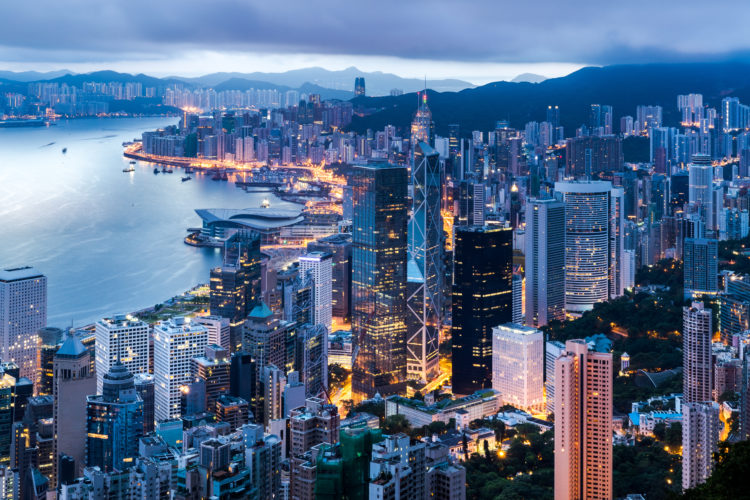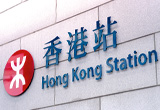Critics claim the 2019 protests in Hong Kong undermine it as a leading global financial center.
Olin’s David R. Meyer, however, finds that Hong Kong’s status is secure for three reasons:
- China’s government will continue to support it;
- Hong Kong’s financial networks possess extraordinary scale and sophistication;
- and no viable alternative center has emerged to challenge Hong Kong as the Asia-Pacific leader.

Meyer, a senior lecturer in management and expert on East Asian and international business, puts forth his arguments in “The Hong Kong protests will not undermine it as a leading global financial centre,” published online in April in Area Development and Policy.
“The Hong Kong protests will not undermine it as a leading global financial center,” he said, citing his research that draws on the “geography of finance” research on global financial centers.
Protests begin
The protests started in mid-March 2019 after the government sought to allow extradition of suspects between Hong Kong, Mainland China, Taiwan and Macau in criminal cases. Then, on June 9, came the march of “more than a million Hongkongers,” according to organizers.
As Meyer notes in the paper, protesters issued five demands: withdraw the extradition bill; make an independent inquiry into police enforcement; retract the “riot” classification of violent protests; drop charges against demonstrators; and reform elections.
Protests and riots continued into the fall. By November, demonstrations reached the airport and temporarily closed it, protesters took over university campuses and disrupted the rapid transit system. Later that month, voters swept anti-government candidates into office in district elections. Then, as violent protests declined, peaceful protests continued this year.
‘Network hub of global capital’
Now critics claim the protests threaten Hong Kong as a leading global financial center. They suggest Hong Kong’s importance to China will fade because activities such as initial public offerings, bond sales and currency trading will be done elsewhere, Meyer says in his paper.

They speculate that other cities—among them Singapore, Beijing, Shanghai and Shenzhen—will compete with Hong Kong and that financiers will move their business to other cities.
“These are serious claims,” Meyer said.
Yet the claim that the protests threaten Hong Kong as a leading center “fails to recognize that the city’s significance rests on its status as a network hub of global capital,” Meyer said.
“Based on this perspective,” Meyer writes in the paper, “I argue that the protests do not threaten Hong Kong as a global financial center because its networks of capital are resilient.”
No other financial center in the Asia-Pacific region has the ability to replace it, he says.
Almost two centuries of stability
Research on global financial centers shows a high degree of stability at the upper-ranked centers dating back for almost two centuries, Meyer notes in the paper.
London had replaced Amsterdam as the leading center by the 19th century, and New York joined the top centers in the early 20th century. Hong Kong became the leading financial center in Asia by the late 19th century, according to the paper.
This relative stability of the upper-level financial centers persists, Meyer says. Even the 2008 global financial crisis couldn’t significantly disrupt the ranks of the top financial centers.
(Meyer says the COVID-19 crisis “will have no consequence other than near-term disruption of activity as is occurring in all major financial centers.”)
And even though China’s leaders are unhappy with the Hong Kong government and outraged over the violent protests, no evidence suggests that they will undermine the city’s financial community, according to the paper.
“Hong Kong’s financial community occupies the highest level of specializations in finance and contains multi-faceted, complex and internally connected networks,” Meyer writes.
“Components of these networks reach across Asia and globally, which means Hong Kong is the pivot of financial expertise and knowledge in the region.”





 After Hanoi we traveled over to Siem Reap which is in Cambodia. Here we saw the world famous temple named Angkor Wat. It was incredible. We went at sunrise and spent most of the day in these temples. Words really cannot describe the intricate detail going into this immense complex of temples; the time spent by the Khmer people building these temples and maintaining them is unimaginable to me, and draws my immense respect. Go to Angkor Wat and experience it for yourself. At left is a photo I snapped of the sun rising over the main temple.
After Hanoi we traveled over to Siem Reap which is in Cambodia. Here we saw the world famous temple named Angkor Wat. It was incredible. We went at sunrise and spent most of the day in these temples. Words really cannot describe the intricate detail going into this immense complex of temples; the time spent by the Khmer people building these temples and maintaining them is unimaginable to me, and draws my immense respect. Go to Angkor Wat and experience it for yourself. At left is a photo I snapped of the sun rising over the main temple. It was still cool to see the other side of the story though. The next day we went to the Mekong Delta where we took several boat rides, saw locals making candy, and had some specialty tea. The day was very pleasant and allowed us to really experience the delta up close. We packed up and came back to Hong Kong the day after.
It was still cool to see the other side of the story though. The next day we went to the Mekong Delta where we took several boat rides, saw locals making candy, and had some specialty tea. The day was very pleasant and allowed us to really experience the delta up close. We packed up and came back to Hong Kong the day after.

 Day #2 – Heading on the MTR to City Plaza, Taikoo Shing, HK started our day with WU alum Manyee Chow EN ’81, at Sony Pictures Entertainment. The group was treated to goodie bags filled with Sony products while we learned about the highly competitive industry of motion pictures, international distribution and the challenges of a changing business model within the film industry.
Day #2 – Heading on the MTR to City Plaza, Taikoo Shing, HK started our day with WU alum Manyee Chow EN ’81, at Sony Pictures Entertainment. The group was treated to goodie bags filled with Sony products while we learned about the highly competitive industry of motion pictures, international distribution and the challenges of a changing business model within the film industry.